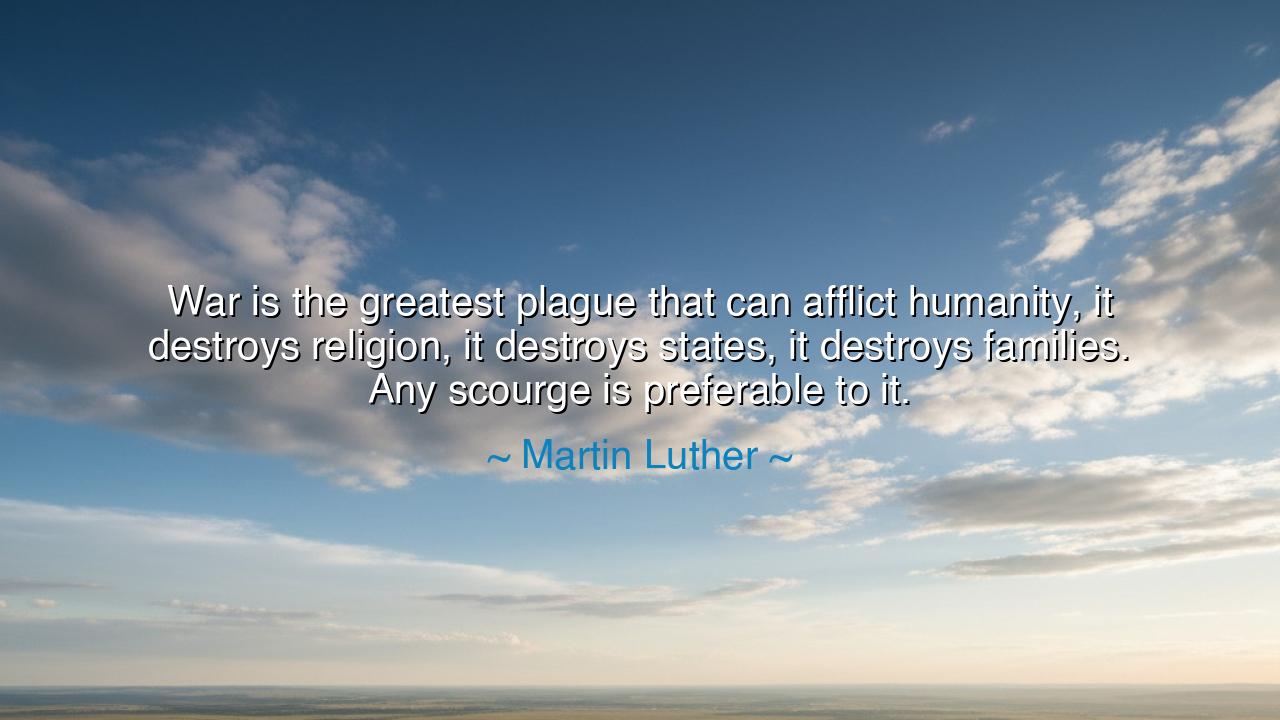
War is the greatest plague that can afflict humanity, it destroys
War is the greatest plague that can afflict humanity, it destroys religion, it destroys states, it destroys families. Any scourge is preferable to it.






"War is the greatest plague that can afflict humanity, it destroys religion, it destroys states, it destroys families. Any scourge is preferable to it." These words, spoken by the great reformer Martin Luther, bear the weight of centuries of human suffering and devastation. He saw war not as a mere conflict between armies, but as a force of nature capable of erasing the very essence of civilization. In this declaration, Luther speaks to the horror and destruction that war brings to the soul of humanity—how it shatters not only the physical world, but the intangible bonds that hold society together: faith, family, and government. His words ring with the wisdom of one who has witnessed the darkness of war and its long-lasting scars upon the human spirit.
To understand the depth of Luther’s statement, let us first consider the true nature of war. War is not just a clash of armies—it is a force that obliterates everything in its path. It does not merely destroy buildings and landscapes; it decimates the very fabric of human society. When war comes, it brings division, suffering, and chaos. It does not discriminate between the powerful and the weak, the young and the old, the noble and the common. It reaches into every home, every village, every community, and leaves behind a trail of destruction. The peace of a family is shattered as fathers, sons, and brothers are sent to die; the integrity of states is undermined as institutions crumble; and the sanctity of religion is lost as faith becomes twisted to justify violence. In the face of war, humanity is reduced to its basest instincts, and all that is noble is torn asunder.
Consider the Thirty Years’ War, a conflict that ravaged Europe in the 17th century, leaving entire nations in ruin. The war was fought in the name of religion, but it soon became a struggle for power and dominance. Throughout the bloodshed, countless lives were lost—not only soldiers, but civilians, women, and children. The land itself was scarred, and once-thriving communities were reduced to ashes. The war lasted for decades, bringing devastation to every corner of the continent. What had once been flourishing states, vibrant cultures, and strong families became mere shadows of their former selves. The war left behind a generation of orphans and widows, a people disillusioned and broken. In this example, as in many others throughout history, the great plague of war did not leave behind an empire of glory; it left behind a wasteland of despair and hopelessness.
Luther's words remind us that war does not only destroy the material—it attacks the very soul of humanity. It destroys our capacity for compassion, for cooperation, and for community. When men go to battle, they are often driven by fear, anger, and the need for revenge. The violence of war clouds our judgment, erodes our humanity, and turns us against one another. The families torn apart, the faiths twisted to suit political ends, and the governments corrupted by greed—all are testaments to the poisonous influence of war. The human heart, which should be filled with love and understanding, becomes hardened and closed off in the face of such conflict. We forget the very things that make us human: our shared dignity, our desire for peace, and our capacity for mercy.
Yet, Luther also teaches us that there is hope even in the darkest of times. His warning is not only a reflection of the devastation wrought by war, but also a call to action. He urges us to recognize the horror of war and to work tirelessly to prevent it. Every generation must commit itself to the preservation of peace, to the nurturing of justice, and to the building of understanding between peoples. We must never forget that the sacrifice required for war is not only borne by those who fight on the front lines, but by everyone—by the innocent civilians, by the families left behind, and by the very spirit of civilization itself. Our duty, then, is to find ways to resolve conflicts without resorting to violence, to seek dialogue rather than destruction.
In our own lives, we must take up the mantle of peace and wisdom. The lesson from Luther is clear: war is not an inevitable part of human existence, but a tragedy that we must work together to prevent. It is easy to look at the world around us and feel powerless in the face of global conflicts, but our actions in the small moments matter. We can choose to build bridges of understanding, to engage in peaceful dialogue rather than division, and to teach future generations the value of compassion over conflict. Peace begins not on distant battlefields, but in our homes, our communities, and our hearts.
Ultimately, Luther’s words urge us to reclaim our humanity in the face of violence and strife. Let us stand firm in our commitment to peace, for it is the greatest antidote to the plague of war. We must honor the sacrifices made by those who suffered in past conflicts, and ensure that their suffering was not in vain. Through understanding, forgiveness, and cooperation, we can create a world where war is not the inevitable response to disagreement, but an obsolete memory, fading into the past where it belongs. Let us choose peace, not just as a lofty ideal, but as a tangible action in our daily lives.






AAdministratorAdministrator
Welcome, honored guests. Please leave a comment, we will respond soon